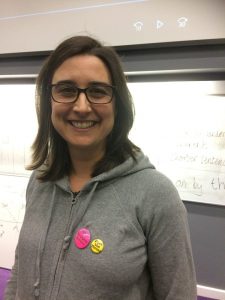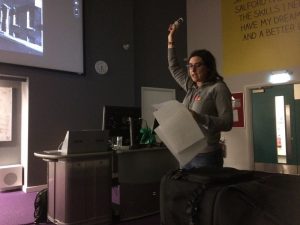Queer Noise: Abigail Ward celebrates Manchester’s loud and proud gay culture
| 13th February 2018
“When people say ‘Manchester music’ they tend to think of something very white and very male, like Oasis, the Stone Roses and Madchester,” DJ Abigail Ward says. “I like to look at the alternative, unsung stories.”
Abigail, the co-founder of the Manchester Digital Music Archive, spoke about the people and places that shaped the city’s influential gay scene as she presented Queer Noise at LGBT History month in Salford University Student’s Union.

The presentation on gay culture in Manchester covered four different eras: the secret queer scene from the 1950s and 60s; the strange relationship between the punk scene and the queer scene in the 70s; the way Manchester rallied against AIDS and a homophobic government in the 80s; and the rise of “alt-queer” clubbing in the 90s.
One of her favourites is Buzzcocks frontman Pete Shelley; openly bisexual, Shelley used gender-neutral lyrics and challenged the macho, aggressive image of punk with his effeminate style.
He also arranged the Sex Pistol’s legendary 1976 gig at the Lesser Free Trade Hall, which inspired numerous artists including Joy Division, Morrissey, and Mark E. Smith. “He was ahead of his time and made the punk scene feel just a little more open to queer artists,” says Abigail.
Abigail also discussed some of the venues that have provided a safe space for LGBT revellers over the years. Again, she has focussed on lesser-known places that have a personal meaning to her. “I don’t really enjoy going down to Canal Street very much and I can’t really relate to a lot of what goes on there.”
Instead she chose Homoelectric, an “alt-queer” venue that rejected the clichés of gay clubs – fake tan, cheesy music, exclusivity – and played hip hop and rock. It was the first queer night Abigail went to when she moved from Preston to Manchester as a teenager. “It was the first time I’d met people who really gave a f*** about the same type of music I was into. You can be really outrageous, really be yourself and put together some amazing music.”
Abigail understands why the queer community are drawn to Manchester. “If you look at our political history you’ll see there is a fine tradition of being different and opposing things. I think that’s why people here have a really defiant sense of visibility and partying.” 
The Manchester Digital Music Archive is an online exhibition dedicated to Manchester’s cultural and social history. It is run by volunteers and depends on public donations of photographs, posters, gig tickets and more.
“There’s all these multiple histories and multiple versions of events,” says Abigail. “We believe that there is no one history of Manchester music.”
Unfortunately, it means that some groups are under-represented. “We could do with more items related to trans clubbing. You never know if you might have something in your attic, something in a shoebox that could go on our website.” After all, Manchester’s gay scene has always been proudly on display…
Abigail will DJ at the opening of Suffragette City, an exhibition celebrating Manchester’s female musicians, at The Refuge on Friday 23 February.
Book tickets here: eventbrite.co.uk
You can donate to the Manchester Digital Music Archive at mdmarchive.co.uk
